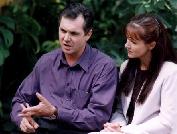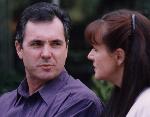![]()
THE PRO-FILE
ACTING IN A SERIAL (PART THREE)
 In
part two of this interview Jackie Woodburne and Alan Fletcher
examined their view of the acting process as it is for them when
working in serial television. Here, in part three, they examine
coping with the work load and also explore some of the techinical
aspects of dealing with the multi-camera element of fast turn-around
television production.
In
part two of this interview Jackie Woodburne and Alan Fletcher
examined their view of the acting process as it is for them when
working in serial television. Here, in part three, they examine
coping with the work load and also explore some of the techinical
aspects of dealing with the multi-camera element of fast turn-around
television production.
Richard: I was looking at the schedule that we were working on the other day and did a little bit of adding up. I discover that you started at 6.30, Jackie, and Alan at 6.45. You did one scene on location between 8.00 and 9.00 and then you came to the studio. Alan your first scene was at 11.00am and:-
- you were in five scenes,
- totaling seven minutes of screen time,
- you had to learn 527 words,
- 50 speeches,
- and you didn't finish, until about 5 o'clock.
Jackie finished about 6pm. Now, is that an average day.
Jackie: It comes and goes. It's not unusual to have a day like that. Occasionally you will get a day where you start later and you finish early.
Alan: Or a day off.
Jackie: A day off occasionally.
Alan: We tend to live by our schedules. This is the practical side of being an actor, if you like. You get your schedule and you fill your diary in and then you plan all the other things that go along with life. You take children to school or catch up with friends or get something for the garden. And you slot those in. Everybody has the responsibility of planning their life to make sure that when they get up at 6.45 they are awake.
Jackie: This is the discipline too of working this quickly. You are saying 'I've got 16 scenes tomorrow, I'm not doing anything tonight'. I mean that's a discipline as well.
Alan: There are some actors that actually think they are invincible. This is often when you are younger. They will go off and do something at night knowing that they have work the next day, thinking 'it'll be fine', because younger people often do find easier to learn lines and all that sort of stuff. They think they are invincible but you see people slowly hit the wall through the year and come August and September everyone starts getting sick and…
Jackie: Dragging around.
Alan: You have obviously a professional responsibility to keep yourself fit.
Richard: And what about the business of learning lines? How long does that take?
Alan: It does depend on the type of dialogue.
Jackie: It depends on the rehearsal process too. Often you can get a pretty good idea during the rehearsal which is the much easier way to learn lines... sort of in situ. Be there and do it. But I would say most of us would go home at night and spend a significant amount of time….
Alan: I learn in the car.
Jackie: … just sitting with the book. Well, it depends….a couple of hours!
 Alan: If you had 10 scenes
the next day you would easily spend a least two hours preparing
for them. It depends on how well written it is too. Well written
dialogue tends to go into your head, badly written dialogue,
you don't know why, but you can't learn it. It also depends on
who you are working with. When I work with Jackie, for instance,
we listen to each other very carefully and often our lines will
change. We won't get them right. The positioning of a word will
change….the tense or something. It doesn't matter..as long
as you are listening you can respond to the change….it doesn't
affect the script, it doesn't worry anybody. So we don't always
learn our lines verbatim.
Alan: If you had 10 scenes
the next day you would easily spend a least two hours preparing
for them. It depends on how well written it is too. Well written
dialogue tends to go into your head, badly written dialogue,
you don't know why, but you can't learn it. It also depends on
who you are working with. When I work with Jackie, for instance,
we listen to each other very carefully and often our lines will
change. We won't get them right. The positioning of a word will
change….the tense or something. It doesn't matter..as long
as you are listening you can respond to the change….it doesn't
affect the script, it doesn't worry anybody. So we don't always
learn our lines verbatim.
In fact we never learn our lines verbatim. I've just done a scene in the classroom where I had three large speeches and it did not concern me that I might not be word perfect. What concerned me was that we had to have a sense of the nervousness, we had to have the sense of the bumbling, the actual mood of the speech was far more important than what was actually being said.
Richard: But it is multi-cam television and they are cutting on lines....?
Alan: Indeed.
Richard: There's a vision switcher waiting for that cue and so you can't actually play with the lines too much.
Alan: And sometimes if you are in a panic and you sort of think, I don't really know it word perfect you can actually go and say, where are the cutting points. You know, what's important for the cut.
Jackie: So you can really focus on those really important things.
Alan: And make sure that what ever you say …
Jackie: That you say those words.
Alan: If you respect people because you know they have a job to do and you make them aware that you know that you could possibly muck them up and you would like to make sure that you don't muck them up, they respect that. And they will help you as well by respecting the fact that you might not be a machine and say exactly the same thing every time. The sound guys…they have to swing a boom around and if you start saying things that are not scheduled to say….they can't get a boom onto you. You just have to be aware of them. Well, you don't have to; we do it because we choose to. We like doing it that way.
 Jackie: But I think its interesting
because it does keep coming back to this ensemble thing. I really
do think that would be the most important element - accommodating
each other. Rather than coming in with your bag of secrets about
your character and what their journey is in this scene …
to be bigger than that and as a result I would imagine your performance
would be richer because you are taking on other people's information
as well. So it is really about an ensemble thing.
Jackie: But I think its interesting
because it does keep coming back to this ensemble thing. I really
do think that would be the most important element - accommodating
each other. Rather than coming in with your bag of secrets about
your character and what their journey is in this scene …
to be bigger than that and as a result I would imagine your performance
would be richer because you are taking on other people's information
as well. So it is really about an ensemble thing.
Alan: Indeed, we mustn't give the impression that its all about us accommodating the technical.
Jackie: Oh, God, they save us.
Alan: In many cases its us going to them saying....
Jackie: Many times.
Alan: Look, now look you are pushing us so close I can't do a scene that close to a person's face. Or the sound guys will say, can you lift your volume, and sometimes you have to turn around and say 'well, look…no', because the emotion requires a much more hushed thing.
Richard: Can they cope?
Alan: Well, yes. They have to.
Jackie: They compromise ... yes, you find a way.
 Alan:
They
know they have to because the performance in the end, is always
the most important thing. If you are five hours late then you
have got to prioritize things but certainly the performance must
always be important.
Alan:
They
know they have to because the performance in the end, is always
the most important thing. If you are five hours late then you
have got to prioritize things but certainly the performance must
always be important.
In Part Four Alan and Jackie offer advice to guest actors and discuss the pitfalls that can emerge from becoming part of the serial television circus.
| << GO TO PART TWO |
< BACK TO THE PRO-FILE
INTRO | ABOUT | WORKSHOPS & CLASSES | TESTIMONIALS | LATEST NEWS | WORKING ACTOR
GREENROOM | DIRECTOR'S NOTES | QUOTARIUM | DIARY | OFF-CUTS | AUDITIONS | CONTACT
All contents copyright © The Rehearsal Room unless othewise stated
|
|
|
|
||||||
|---|---|---|---|---|---|---|---|---|
|
|
|
|
||||||
|
|
|
|